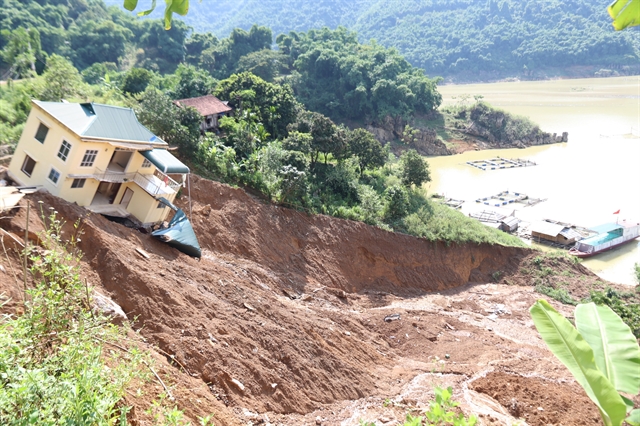 Society
Society


|
| A house teetering on bring following a landslide in the northern city of Hòa Bình after Typhoon Sơn Tinh hit Việt Nam in July 2018. Natural disasters left 224 dead and missing last year and caused economic losses of VNĐ20 trillion (US$851 million). — VNA/VNS Photo Thanh Hải |
HÀ NỘI — Localities, sectors and people nationwide have been urged to respond to natural disasters in a more active, prompt and effective manner.
“According to United Nations and international organisations, Việt Nam is one of ten countries threatened the most severely by natural disasters," Prime Minister Nguyễn Xuân Phúc said on Thursday at a national online conference on natural disaster prevention, control, search and rescue. "Without active prevention and control, we will suffer from huge losses."
The conference took place ahead of the storm season, sending a message to encourage everyone to work to prevent and control natural disasters.
Active and effective prevention aims to minimise property losses, he said, highlighting the importance of risk management.
Natural disasters cause huge losses every year. There are still many fatalities due to floods and landslides.
According to the Ministry of Agriculture and Rural Development, natural disasters left 224 dead or missing in 2018, down 30 per cent from the previous year. Total economic losses caused by natural disasters reached VNĐ20 trillion (US$851 million).
So far this year, 23 people have died or gone missing due to natural disasters. Economic losses were estimated at more than VNĐ337 billion ($14.3 million)
PM Phúc said one of shortcomings in natural disaster prevention is weak infrastructure. In many places, the safety of residential areas is overlooked. There is a shortage of docking areas for boats and ships and a lack of investment in upgrading dikes, reservoirs and dams. Many urban areas flood after torrential rains because they have low-capacity drainage systems.
“Extreme, unpredictable weather has become a challenge for natural disaster forecasting and prevention,” he said. “The increasing size of the economy and population, industrialisation and urbanisation require localities and sectors to take more drastic measures."
Many localities and sectors have not included natural disaster prevention plans in local and economic development plans. As a consequence, some residential areas were established in flood- and landslide-prone areas, PM Phúc said.
One of the core tasks is to review, update and complete natural disaster response plans to be ready for any surprising scenario, he said. It is important to conduct training and rescue rehearsal drills in local communities.
The leader urged localities and sectors to improve the quality of natural disaster forecasting and prioritise allocating budget and calling for outside investment to upgrade natural disaster prevention infrastructure and forecasting and monitoring systems.
Minister of Agriculture and Rural Development Nguyễn Xuân Cường said that due to the impacts of climate change and rising sea levels, natural disasters are predicted to become more unpredictable and extreme.
There will be more torrential and unseasonal rain. Storms are expected to hit areas which were less likely to be at risk in the past.
From June until August, the water level of rivers in the north will rise to high warning levels, Cường said. Big floods are less likely in the Mekong Delta region but waters will still rise faster than normal.
Cường told the conference the ministry will establish a national steering centre on natural disaster prevention and control by the end of this year, and install flash flood and landslide warning systems on a trial basis in some mountainous areas. — VNS